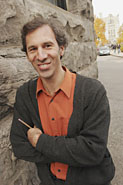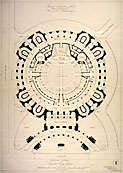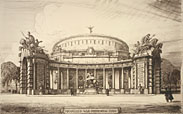Aurèle Parisien: Acquisitive fellow
Editors are visionaries. They're like film directors who can imagine the end result from looking at a script. "There are so many ways to film a story," says Aurèle Parisien, acquisitions editor for McGill-Queen's University Press (MQUP). "If you read the script for Goddard's Breathless, there's nothing going on.

Owen Egan
"An editor marshals people, resources, craftsmen, and then gets to see it happen," Parisien says. "Publishing is an art form, we're making things,"
MQUP's goal is to produce smart, beautiful, and significant books. With over 1800 in print, MQUP has gleaned many awards. This year, six are up for the Canadian Federation for the Humanities and Social Sciences Scholarly Book Prizes (three edited by Parisien). Winners will be announced November 27, the same day MQUP finds out if the Saskatchewan Book Awards honours three of its shortlisted books. And they rarely publish fiction, but Ha! A Self-Murder Mystery — a genre-defying page-turner edited by Parisien and lauded by authors A. S. Byatt and Alberto Manguel — is contending for a Quebec Writers' Federation Literary Award, to be announced on November 24.
Jointly owned by McGill and Queen's, the press maintains editorial offices on both campuses. At McGill, executive director Philip Cercone and history professor John Zucchi are also acquisition editors. All are responsible for managing peer assessment, funding, and contracting. Would-be authors send proposals, near-completed manuscripts, even finished works. Completed manuscript go to peer review to get the nod (or not) for publication. As the people who know most about the content of a book, the editors act as go-betweens for authors and MQUP through revisions, copy editing, the book's design, production, and marketing.
Authors can spend years finishing a manuscript and the publishing process can take several more. "It could be six, seven years, easy. It's like being married," says Parisien about working with his authors. If so, he's a polygamist — he has several hundred authors in active acquisition.
Yet sometimes the process goes quickly. After the Supreme Court's December 1999 decision on Mi'kmaq fishing rights, Parisien cold-called Native studies scholar Ken Coates about writing a book on the issue. By October 2000, The Marshall Decision and Native Rights was on the shelves. "And people say we're slow," Parisien laughed. By contrast, Uqalurait, the first history of Inuit life from an Inuit perspective, took seven years to dot all the i's and cross all the t's. But there's no rushing a tome that will hold its own among historical texts for the next century, says Parisien.
So do university press books sell? "Trade publishers want to sell 90 percent in the first six months," he explained. "Our books sell over several years." Initial print runs are from a few hundred to 3,000. In a country where 5,000 copies makes a best seller, if MQUP moves 1,200 they're doing fine.
Parisien first worked at MQUP between his McGill BA and MA in philosophy. After starting a PhD at MIT, he returned to teach at Marianopolis and set up a multidisciplinary Canadian Studies course. He had experience with advanced scholarship, a wide range of disciplines, the world of writing from his years as a theatre critic and was a practiced administrator. So when MQUP needed an editor, they turned to Parisien. He's flourished there since 1996, and is further honing his sense of vision by pursuing a degree in photography at Concordia University.
So what keeps him going in the face of long hours, deadlines and battles with cantankerous authors? "I love books that try to change the world or at least fix some small part of it — books that are impassioned. That's what does it for me."
And he's also had some brushes with history. When MQUP translated Jacques T. Godbout's L'esprit du don, Parisien tracked down deconstructionist Jacques Derrida, who had written a complimentary letter to the author. He hoped for a quote for the book jacket. Endless phone calls and transfers and waits didn't prepare Parisien for an unexpected "Oui, C'est moi," at the end of the line in Paris. To Parisien's request, Derrida replied, "'Non. Absolument non!' He said. "All the bouts de phrases cited left, right and centre have rendered my words completely meaningless. Now I'm telling everyone 'Non'," Parisien said imitating Derrida's haute Parisian accent.
Upon hanging up, he realized, "I had Derrida on the phone, the philosopher of indeterminacy and contradiction, telling me he wasn't going to do something because he had to maintain a strictly Cartesian position of absolute consistency.
"I blew my chance!"
 |
||||
|
In Japan they assemble [prefabricated] homes wearing white jackets and white gloves. They regard homes as industrial-design products. We view them as construction products. |
||||
The war memorial that never was

On November 11, 1918 at 11 in the morning, the mighty armies ranged across the fields of France and Belgium lay down their arms for good. After more than four years of fierce fighting, the Great War was over.
Canada was proud but, like the rest of the world, shocked by the slaughterhouse that Europe had become. We had grown as a nation. Prime Minister Robert Borden attended the Paris Peace Conference to represent Canada's interests as separate from those of the British for the first time.
The War left its mark on McGill as well. Students, alumni and professors had all fought in the battlefields of Europe. Many died or were wounded.

Percy Nobbs collection, Canadian Architecture Collection
The question arose as how to best commemorate these men before the war even ended, in 1917. Architecture professor Percy Nobbs believed he knew the answer: A convocation hall, able to seat 3,000, would be the most appropriate honour.
"While overseas, I have taken the opportunity of studying several halls of kindred purposes in Paris, London and in Edinburgh… I feel there is an opportunity for a really monumental interior in which the whole audience would be visible among themselves, and the entire scheme of decorative painting could be seen from any seat. This new solution of the requirements as decided upon results in a circular building with a monumental entrance colonnade flanked by triumphal arches. An opportunity is thus afforded to express in sculpture, decoration and inscription the triumph of our Arms by sea and by land," wrote Nobbs in 1919.
One version of Nobb's vision would have had the exterior entrance of the hall decorated with massive stone sculptures of noble lions and a spear-wielding charioteer. The hall would have faced south on the corner of McTavish and Sherbrooke where the McLennan library is today.
It did not matter in the end. The Board of Governors, although enthusiastic about the project, refused to provide funding, recommending that the Graduates' Society be asked to raise the money. It was later decided that the new gymnasium complex would be a fitting tribute to the fallen, and the convocation hall was never built.
 |
||||
|
You will find people who experience the reverse: They get depressed in the summer — although I've never met one. |
||||
